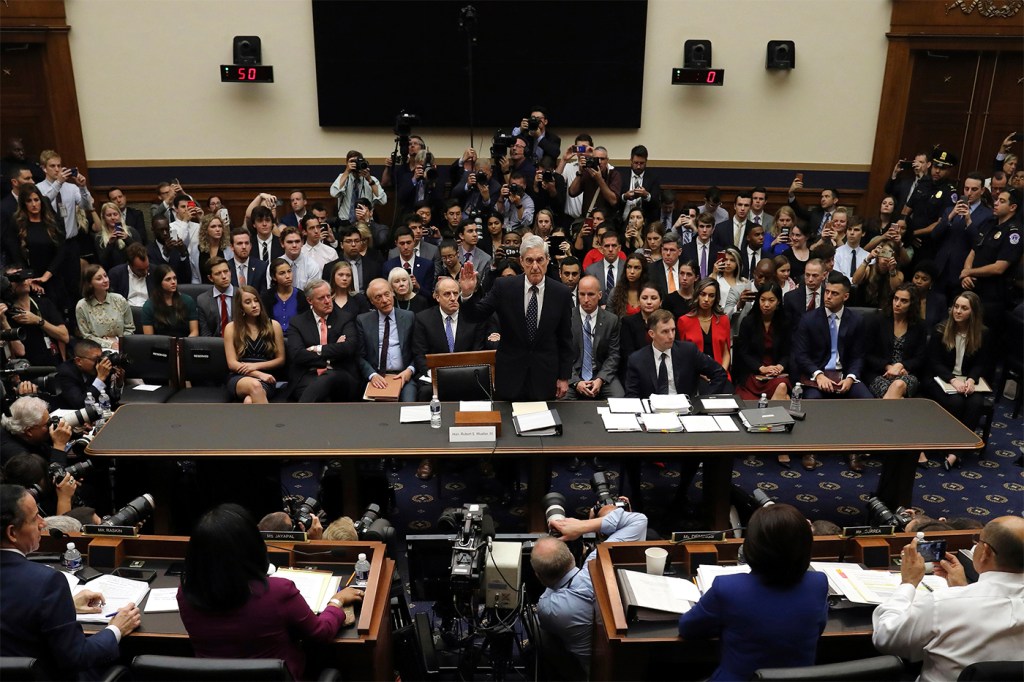Robert Mueller’s congressional testimony is unlikely to change minds on whether President Trump obstructed justice during the Russia investigation

During a mostly uneventful hearing before Congress on Wednesday on his investigation into Russian meddling in the 2016 election, former Special Counsel Robert S. Mueller made one comment that sparked controversy around the country.
Huge:@RepTedLieu explains 3 elements of obstruction of justice, Mueller confirms Trump met all 3. Then:@tedlieu: "The reason… you did not indict Donald Trump is because of OLC opinion stating that you cannot indict a sitting president, correct?"
Mueller: "That is correct." pic.twitter.com/aJ553CNfCg
— Rep. Don Beyer (@RepDonBeyer) July 24, 2019
Mueller appeared to tell the House Judiciary Committee that he would have indicted President Donald Trump on charges of obstruction of justice if he hadn’t been barred by a policy from the Department of Justice that prevents federal prosecutors from charging a sitting president with a crime.
But he later clarified his statement during testimony before the House Intelligence Committee. “As we say in the report, and as I said at the opening, we did not reach a determination as to whether the president committed a crime,” Mueller said.
In another striking moment, Mueller said that Trump could be charged with obstruction of justice after he leaves office if prosecutors believe the facts laid out in Mueller’s 448-page report warrant it.
Jeremy Paul, a professor in the School of Law at Northeastern, wondered whether the statute of limitations would prevent Trump from being charged with a crime after his presidency ends, especially if he is re-elected for four more years.
“The timing may matter depending on whether Trump is re-elected, but that is not an issue today,” says Paul, who teaches constitutional law.
Trump described the hearings as a “disaster for the Democrats” and said Mueller “did a horrible job” in his congressional appearance. “The Democrats lost so big today,” Trump told reporters on Wednesday afternoon. “Their party is in shambles right now.”
Paul criticized Democrats who questioned Mueller for reading isolated passages from Mueller’s report instead of telling a more compelling story. And he called out Republicans for failing to refute any of the evidence in the report and instead focusing on undermining the credibility of Mueller’s investigation.
“Mueller’s argument during his testimony, and in the report, is that special counsel can decide not to indict because that’s fair, but it can’t say it wants to indict if it’s not allowed,” says Paul. “Mueller is coherent on this. If he found evidence but couldn’t indict, he really had little choice.”
The Democrats lost so BIG today. Their Party is in shambles right now…pic.twitter.com/WDnGSOFzZU
— Donald J. Trump (@realDonaldTrump) July 24, 2019
Paul says he doesn’t think the hearing will change anything. Some Democrats will continue to build the case that Trump should be impeached for obstructing justice, he says, but how that plays out will depend on how the coverage of the testimony develops over the next few days.
“Given that the 2020 election gets closer every day, it may be [House Speaker] Nancy Pelosi’s preference to have the people vote carry the day,” he says.
For media inquiries, please contact media@northeastern.edu.





